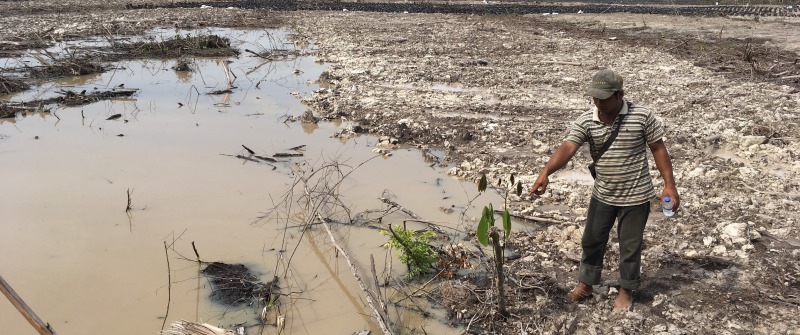
30 Jan Blog: Kalimantan’s sad palm oil revolution
By Ward Berenschot
“See what is left of our rubber trees”, says Titik, the leader of a group of angry villagers. After a magnificent boat ride through majestic forest, I met his group in Rawang, Central Kalimantan, standing at the edge of a seemingly endless muddy field, full of felled tree trunks. They point to a few leaves growing out of the mud – a sapling of a rubber tree, and proof that they once had valuable rubber trees there. Now excavators are preparing the land (their land!) for another massive palm oil plantation.
Titik is a charismatic, intelligent man who used to work for a music company in Java. When he returned to his native village, the palm oil company had just arrived. He and other villagers protested and refused to give up their land: but the company approached the village head and a local thug, offering them 20 euros for each hectare of land that they could make available. The pair went around giving money to people, saying it was a gift from the company. The villagers had to sign a receipt for the money. These same signatures were later presented as proof that villagers agreed to hand over their land. Unknowingly, the villagers had signed away their land for as little as 50 euro per hectare, with no compensation for the rubber trees that had been an important part of their livelihoods.
Today the villagers came to place poles in the ground on the border of the plantation. With small yellow flags on them, these poles seem a puny attempt to stop the excavators from doing their destructive work. But at least these poles are a small, if symbolic, way to protest against the company. Titik and his neighbours have already appealed to the local parliament, to the police and even to the ministry of the environment. But at each institution the company has been bribing people, leaving villagers without many options. Even a demonstration is impossible, says Titik, because the (bribed) police intimidate them and threaten to make arrests. Feeling that their lives and livelihoods are under threat, violence does not seem inconceivable. I am startled to hear them consider the options. “If the government does not do something about this, it could become worse than Sampit [the violence in 1999/2000 against Madurese immigrants]. Manusia Setan [the Dayak’s ‘devil spirit’] will come”.
While these comments are disconcerting – particularly given a recent history of violence in Kalimantan – the frustration of Titik and his friends is understandable. They face a very, very uneven playing field. It starts with Indonesia’s legal system, which prevents villagers from obtaining titles to their land – while enabling companies to acquire concessions. But in fact the whole system – politicians, bureaucrats, police, the courts – because of money or other pragmatic reasons, biased in favour of these palm oil companies. Often local governments do not even demand that companies operate with the required licences.
With palm oil plantations rapidly expanding (doubling over the last ten years!), small wonder that land conflicts are on the rise. In 2014, local environmental organisation Walhi counted 218 such conflicts in Central Kalimantan alone. Last November the general secretary of the provincial government stated that there are now 500 conflicts over land in the province. The outcomes of such conflicts shape the economic future of large parts of rural Indonesia. Yet we know very little about both the scope and particularly the outcome of these conflicts. Most of these conflicts occur mainly outside the purview of the media and even, to a certain extent, outside the purview of academia. These conflicts have only been examined through various (excellent) case studies that highlight the uphill nature of these struggles but cannot provide general patterns. We need to know more about how these projects unfold and what their outcomes are. It is time to embark on a new research project to draw attention to the human costs of Indonesia’s economic development.
(Ward Berenschot is a postdoc at KITLV researching local democracy, clientelism and identity politics in India and Indonesia. His Veni research project ‘Shades of Clientelism: A Comparative Study of Indonesia’s Patronage Democracy’ compares clientelistic practices throughout Indonesia.)




No Comments